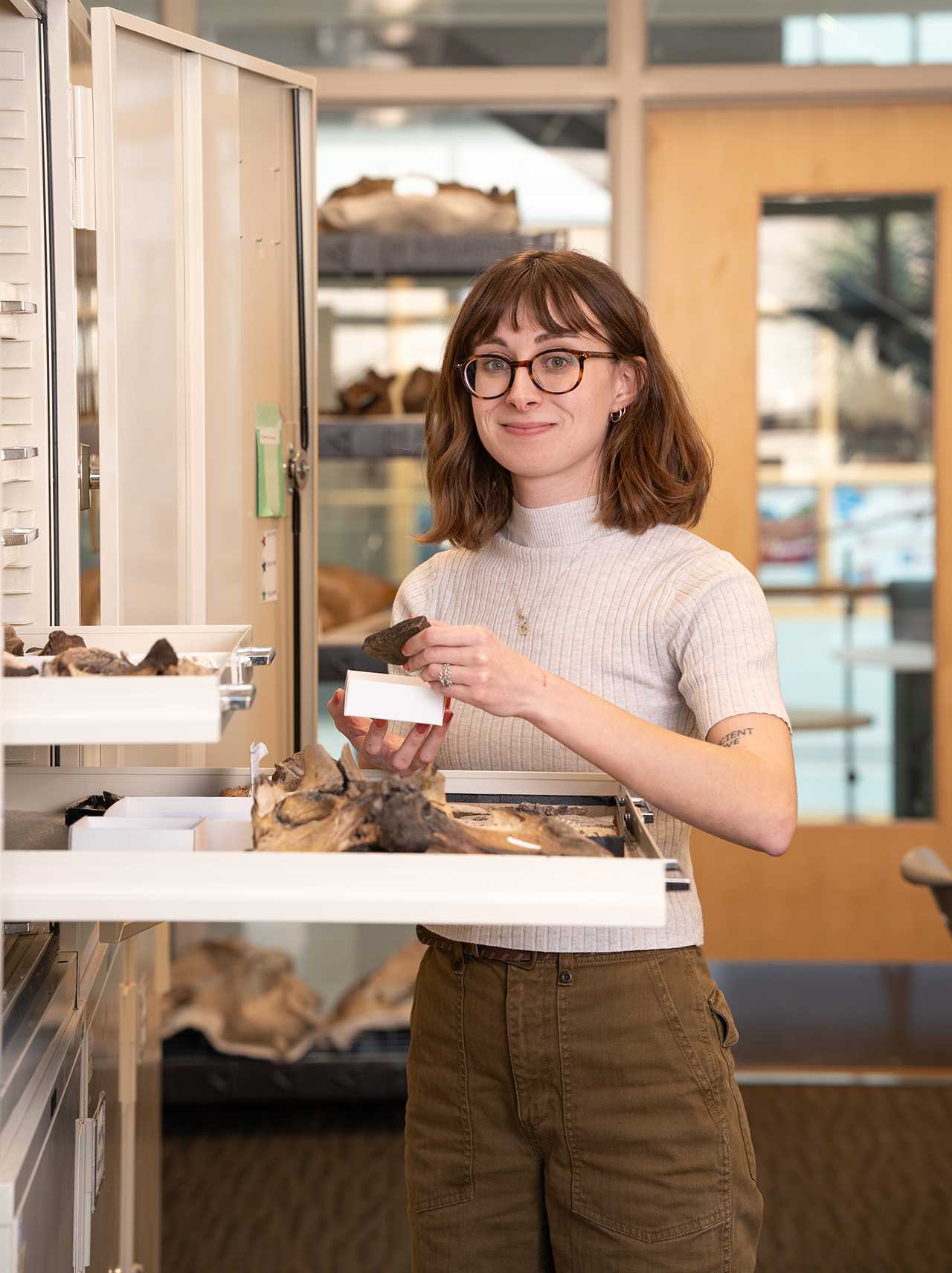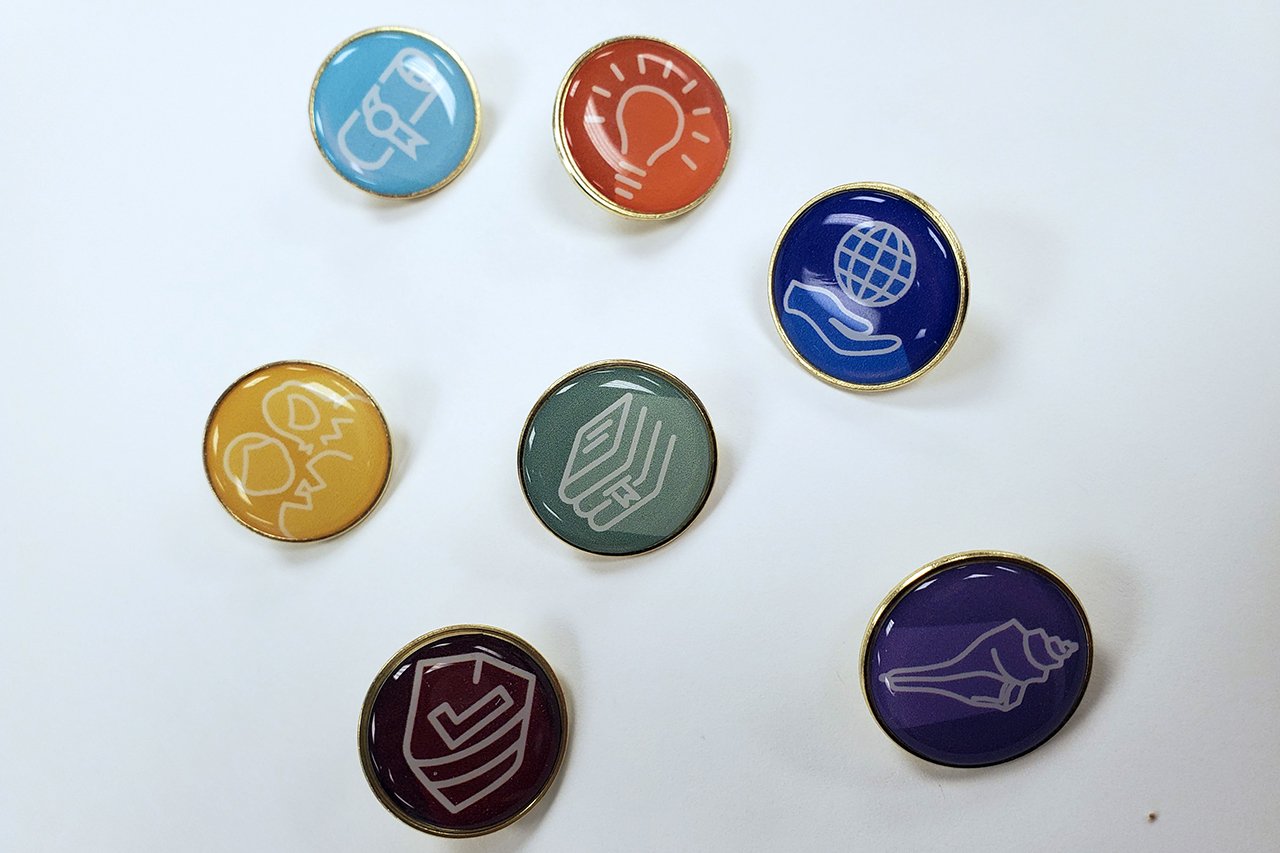Recent CofC Alumna Now Heads Mace Brown Museum Collections
Rebecca Starkey ’23 received a scholarship funded by the Mace Brown Museum of Natural History, where she is now collections and outreach coordinator.

Photo by Catie Cleveland
The new collections and outreach coordinator at the College of Charleston’s Mace Brown Museum of Natural History, Rebecca Starkey ’23 opens one of the 25 beige specimen cabinets inside the collections room on the second floor of the School of Sciences, Mathematics, and Engineering Building. She slides the drawer out and points out the mandible (jawbone) of Xenorophus, an extinct dolphin that lived during the Oligocene Epoch. Asked how many millions of years ago that was, Starkey pauses and then chuckles.

“I have a cheat sheet over here,” she says, walking across the room to her desk, where the geologic timescale is taped to the wall. “Don’t tell the professors that I use this, but that was 33 to 23 million years ago.”
Given that she just started the job on Jan. 3 after in December becoming the first person to graduate from the College with a geology degree and paleontology concentration, Starkey can be forgiven if she doesn’t have all 37 epochs memorized by heart yet – especially since she’s been hard at work co-authoring a research paper on the bones of a pterosaur wing. Cretaceous Research published the paper, which she wrote with her supervisor, paleontology professor Scott Persons, and Michael Habib, a research associate with the Natural History Museum of Los Angeles County Dinosaur Institute, in early February.
“I’m really ecstatic,” she says. “It’s huge opportunity to publish as an undergraduate and makes me more competitive to get into grad school. It really starts my career as a paleontologist and a scientist.”
Starkey first started working on the research during the three-week College of Charleston Paleontology Field School in 2022 to the Badlands of Wyoming near Glenrock. Thanks to a Summer Undergraduate Research with Faculty (SURF) grant, she was able to spend an extra week there studying the wing at the Glenrock Paleon Museum. To write her paper, she returned with precise measurements, numerous photos and a 3D scan of the 4-foot wing, which contains almost 100 pit marks.

Like Cretaceous CSI investigators, the team not only was able to determine that the wing belonged to a certain kind of pterosaur called a Pteranodon (the left wing of a female on the cusp of maturity, no less), but they concluded that opportunistic scavengers like snails or bivalves made the holes while feeding on it. (A warm, shallow sea covered much of North America’s interior 80 million years ago.)
“This paper took a lot of twists and turns as we struggled to make sense out of what we were seeing,” Persons says. “Rebecca doggedly followed the evidence and delved deep into the pterosaur literature. I could not be prouder of her.”
This is Starkey’s second career – and she’s only 28. Raised in Federal Way, Washington, south of Seattle, Starkey earned a bachelor’s in film production from Central Washington University in 2017 before going to work for a few different startups in Seattle. She ended up in Charleston in 2020 when her husband, an Air Force pilot, was stationed at Joint Base Charleston. She enrolled at the College to study botany and, wanting to understand more about Earth processes, wound up in a geology class, which led to Persons’ class on dinosaurs and mass extinction.
“I thought, This is the coolest thing I’ve ever heard of, and started doing more research with him, and eventually declared a whole other major,” says Starkey, who also majored in biology. “I just kind of threw myself into it. I’m extremely happy with where this path has led me and to be involved with the museum.”
It was a full-circle moment when Starkey started working at the Mace Brown Museum of Natural History, since her Paleontology Scholarship was partially funded through museum donations. Her new duties include cataloging incoming specimens, public outreach and revamping exhibits, such as the paleobotany display, which is the one closest to her heart. She also does administration work, such as overseeing student docents – not to mention learning that geologic timescale, of course.
“Our collections have never been more organized, and our engagement with local schools has skyrocketed since Rebecca was hired,” Persons says. “As a student, she showed an extraordinary passion and dedication to the work. The museum and the College are lucky to have her.”



